The Tokyo Nutrition for Growth Summit 2021 will convene in December as part of global efforts to end malnutrition. It will offer a crucial opportunity to accelerate multi-sectoral efforts to tackle a problem that calls for increasingly complex solutions.
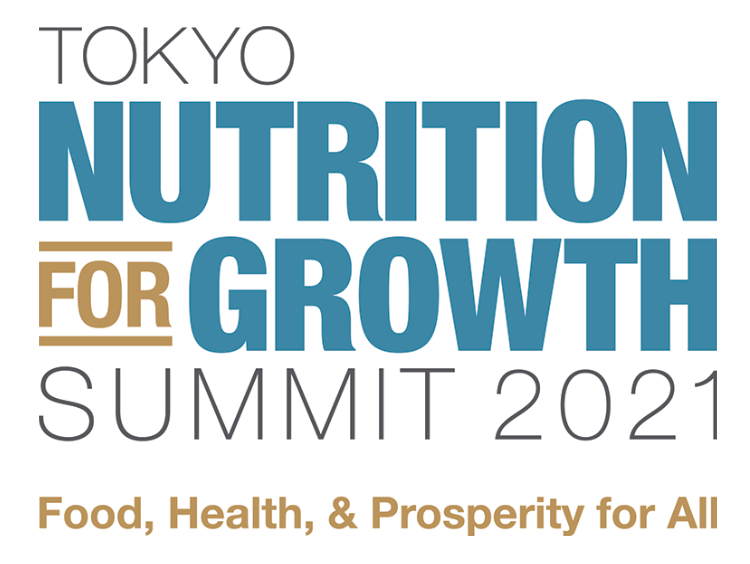
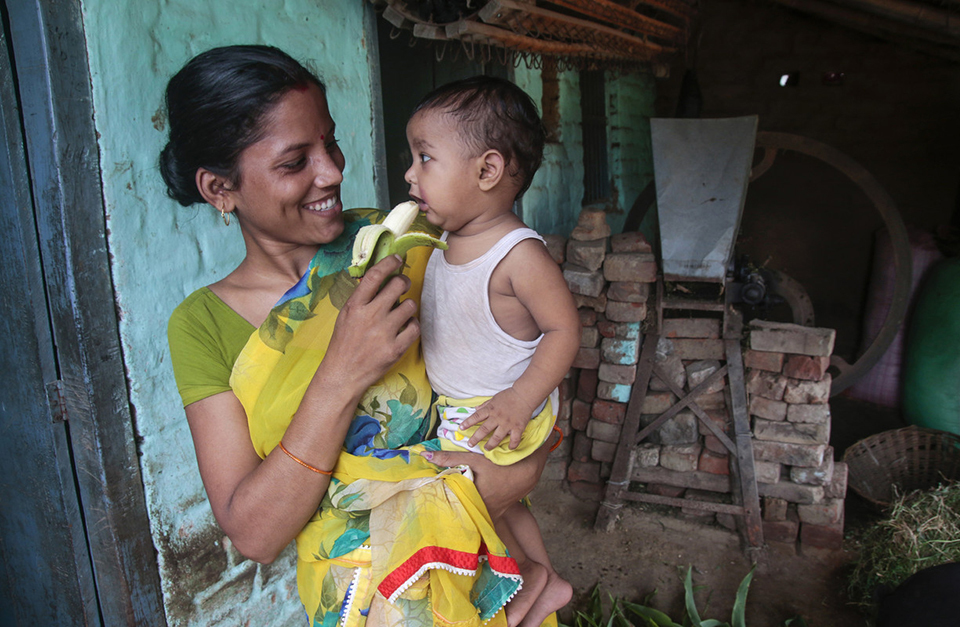
A broad spectrum of leaders will come together at the Tokyo Nutrition for Growth Summit 2021 to work toward a world where everyone is adequately nourished. They will make new financing available for nutrition, announce new nutrition commitments, and work to make those commitments achievable. ALIVE & THRIVE
The Olympic and Paralympic Games present an invaluable opportunity to draw people’s attention away from day-to-day matters to the wider world, by way of sports. Taking advantage of the momentum that the Games create, the Nutrition for Growth Summit is held in conjunction with them, in their host city, offering the opportunity to think globally about nutrition and instigate action.
With the first summit having been held in London in 2013, following the London Olympics of the previous year, the third—the Tokyo Nutrition for Growth Summit 2021—will convene on December 7 and 8. Leaders of governments, international organizations, businesses, civil groups, and academia, and other relevant stakeholders from around the world will gather to discuss five themes: health (making nutrition integral to Universal Health Coverage); food (building food systems that promote safe, healthy diets and nutrition); resilience (addressing malnutrition effectively in fragile and conflict-affected contexts); accountability (promoting data-driven accountability); and financing (securing new investments to tackle malnutrition). The overall goal is to indicate the future direction of global efforts to tackle malnutrition through the following actions: adopting stronger, evidence-based nutrition policies at global, regional, and country levels; pledging to increase financing for proven nutrition-specific and nutrition-sensitive interventions; and making commitments to align and harmonize actions across sectors and stakeholders.
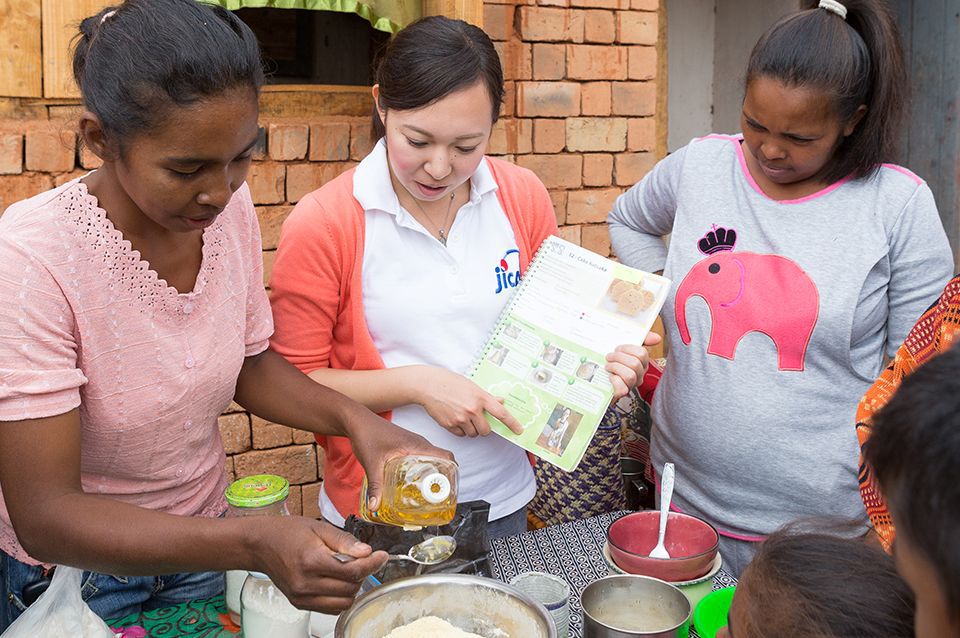
Japan is committed to international cooperation in improving nutrition. For example, a cooking lesson was provided by the Japan International Cooperation Agency (JICA) to teach practical recipes using common ingredients in Madagascar in 2018. SHINICHI KUNO/JICA
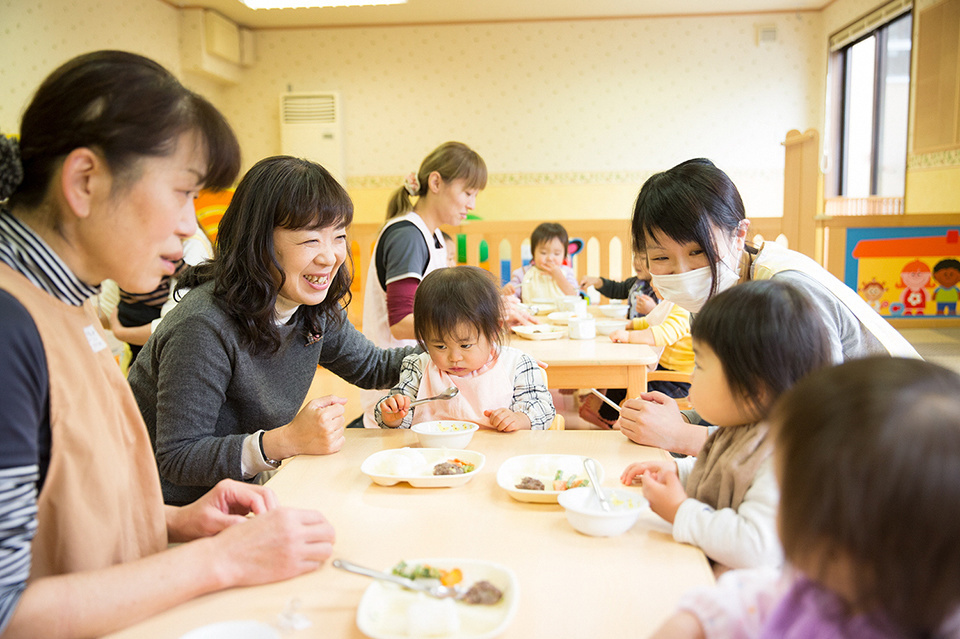
Japan deploys specialists to provide nutritional guidance at schools, childcare centers, hospitals, and other places where nutrition is key. Photo shows a day-care center for infants and children. JAPAN DIETETIC ASSOCIATION
Japan, host of this year’s summit, has reserves of knowledge and practical expertise regarding nutrition that were gained through years of experience. After World War II, the country was quick to rekindle the training of nutritional specialists and establish a cadre of qualified professionals, as well as to monitor the nutritional well-being of its citizens. Not only does Japan provide school lunch programs and nutritional counseling, both of high quality, but it also participates in a wide array of international efforts to improve nutrition. “I think Japan has a lot to share,” says Gerda Verburg, United Nations Assistant Secretary-General and Coordinator of the Scaling Up Nutrition (SUN) Movement. SUN was established by the UN to tackle the world’s nutritional problems and will play a vital role in the upcoming summit by addressing the ways in which participants can commit to the solution to these problems. “In the 1950s and 1960s, Japan learned a lot about the importance of not just food security, but also the quality of food and what food nutrition can do for physical health, cognitive development, and mental well-being.”
Nutrition has become an increasingly complex problem in recent years, with many countries facing what is called the “double burden of malnutrition,” where undernutrition, which stunts growth, coexists with overnutrition, which causes lifestyle-related illnesses and other problems. One in every 10 people in the world suffers from hunger, and one in every three suffers from obesity. “If someone has been stunted as a child, it will affect their metabolism, and then they may be more vulnerable to becoming overweight or obese later in life. In the same families, you can see stunted children and obese adults,” Verburg explains.

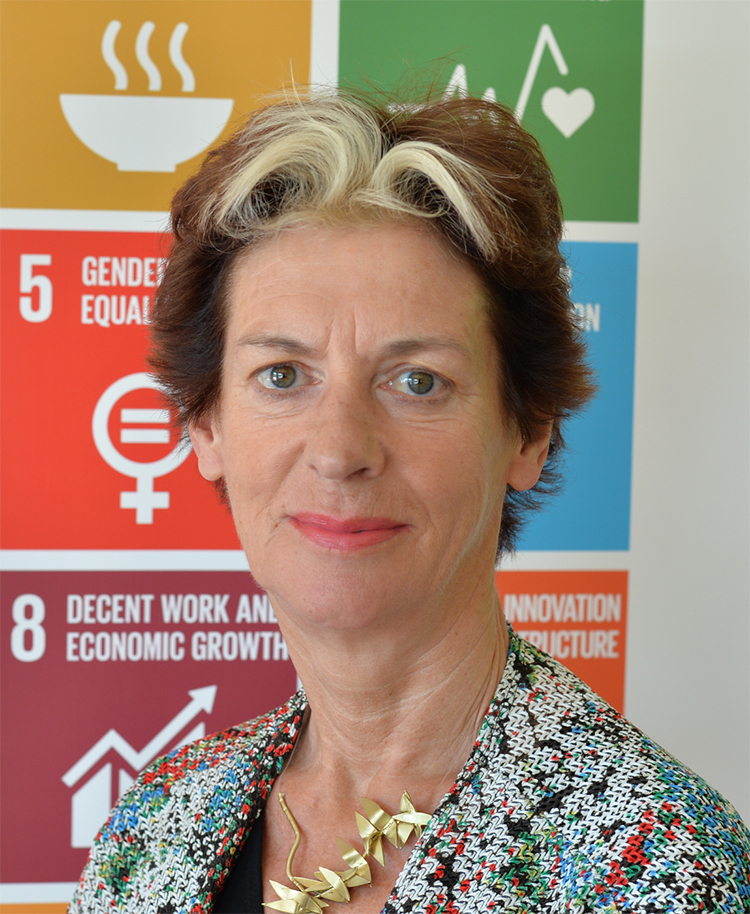
The Scaling Up Nutrition (SUN) Movement, launched in 2010, works globally to bring together people and organizations in government, business, and civil society—as well as across the United Nations system—to improve nutrition. Gerda Verburg (right), formerly Minister of Agriculture, Nature and Food Quality in the Netherlands, was appointed United Nations Assistant Secretary-General and Coordinator of SUN in 2016 by the UN Secretary-General.
Nutritional problems are also deeply linked to serious global issues such as flaws in the food system and climate change. “Our food system is one of the root causes of malnutrition. Our current, imbalanced way of feeding ourselves is bankrupting our health systems and exhausting our planet,” declares Verburg.
A cross-sector approach—involving health, agriculture, the food industry, and education—is essential if we are to deal with such a complex issue. Government–led efforts are not enough; innovation and awareness-raising within the business community and the civil sector are also needed. At the summit, governments, international organizations, businesses, civil groups, and all other stakeholders are expected to make commitments that are both specific and achievable. A successful outcome is greatly desired if we are to accomplish not only the SDG (Sustainable Development Goal) of achieving food security and improved nutrition for the world by the year 2030, but all SDGs, as nutrition drives healthy economies and prosperity. Verburg emphatically says, “I want countries to be extremely ambitious in order not to fail to meet the goals. We need a doubling down on ambition.”





























